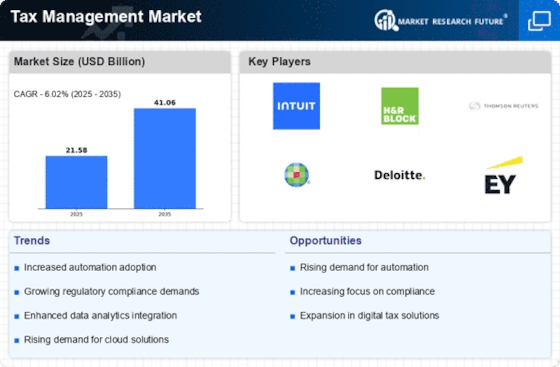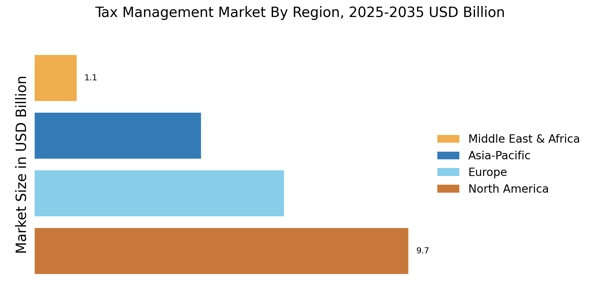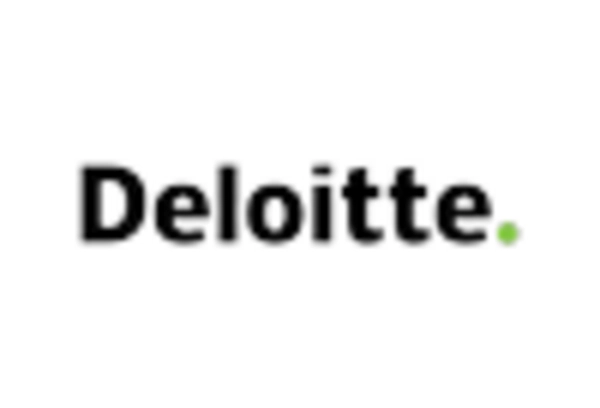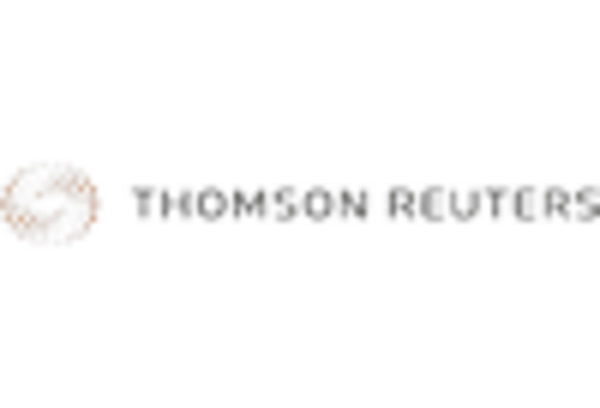Rise of Digital Transformation
Digital transformation is reshaping the Tax Management Market, as businesses seek to leverage technology for enhanced efficiency and accuracy in tax processes. The integration of digital tools, such as automated tax calculation and reporting systems, is becoming commonplace. This shift not only streamlines operations but also reduces the risk of human error, which is critical in tax compliance. Recent statistics suggest that companies adopting digital tax solutions have reported a 30% reduction in processing time for tax-related tasks. Consequently, the demand for innovative tax management solutions is likely to continue growing as organizations prioritize digital strategies to remain competitive.
Growing Focus on Data Analytics
The growing focus on data analytics within the Tax Management Market is transforming how organizations approach tax compliance and planning. Companies are increasingly utilizing data analytics to gain insights into their tax positions, identify potential risks, and optimize tax strategies. By leveraging advanced analytics, businesses can make informed decisions that enhance their tax efficiency. Recent findings indicate that organizations employing data-driven tax management solutions have seen a 15% improvement in tax compliance rates. This trend highlights the potential of analytics to drive better outcomes in tax management, making it a crucial component of modern tax strategies.
Increasing Regulatory Complexity
The Tax Management Market is experiencing a surge in regulatory complexity, driven by evolving tax laws and compliance requirements. Governments are continuously updating tax regulations to address economic changes and ensure fair taxation. This complexity necessitates advanced tax management solutions that can adapt to new rules and provide accurate reporting. As a result, organizations are increasingly investing in tax management software to navigate these challenges effectively. According to recent data, the demand for compliance-focused tax solutions has grown by approximately 25% over the past year, indicating a strong market trend towards sophisticated tax management systems that can handle intricate regulatory environments.
Demand for Enhanced Tax Transparency
The demand for enhanced tax transparency is becoming a pivotal driver in the Tax Management Market. Stakeholders, including investors and consumers, are increasingly advocating for greater visibility into corporate tax practices. This shift is prompting organizations to adopt tax management solutions that facilitate transparent reporting and compliance. As a result, companies are investing in technologies that enable them to disclose their tax contributions accurately and responsibly. Market analysis suggests that firms prioritizing tax transparency are likely to experience improved reputational benefits and stakeholder trust, further driving the adoption of advanced tax management systems.
Globalization of Business Operations
The globalization of business operations is a significant driver in the Tax Management Market, as companies expand their reach across borders. This expansion introduces complexities related to varying tax regulations in different jurisdictions. Organizations must navigate international tax laws, transfer pricing, and compliance requirements, which can be daunting without effective tax management solutions. The market for tax management software tailored for multinational corporations is projected to grow by 20% in the coming years, reflecting the increasing need for tools that can manage cross-border tax obligations efficiently. This trend underscores the importance of robust tax management systems in supporting global business strategies.

















